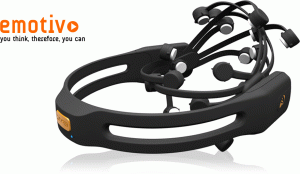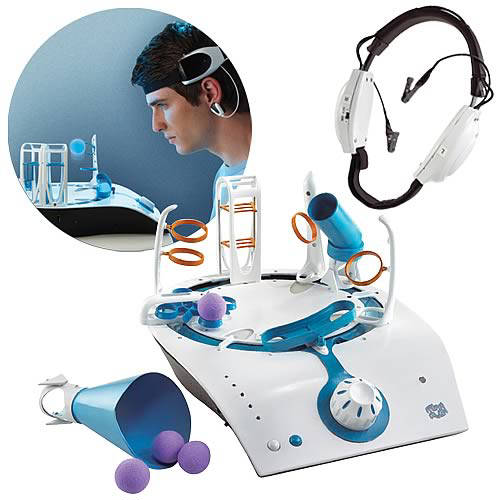Can Pulsed Light-and-Sound Enhance Your Brain?
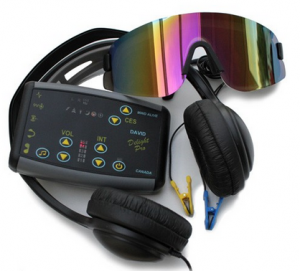 The idea behind mind machines is intriguing. They are simple devices that use pulsed sound and light to trick your brainwaves into certain patterns and put you in specific mental states such as relaxation or alertness. The question is do they really work?
The idea behind mind machines is intriguing. They are simple devices that use pulsed sound and light to trick your brainwaves into certain patterns and put you in specific mental states such as relaxation or alertness. The question is do they really work?
There is some scientific evidence that brainwave entrainment can have a therapeutic impact. There are a handful of small companies that manufacture and have sold mind machines for decades. Yet they remain on the fringe.
While I am not endorsing any specific product or company, you can learn more by checking out this video by the folks at Mind Alive. One of their mind machines (pictured to the right) runs about $500.
In the video they talk about how this technology delivers a “made to order mental state”. They also emphasize that given its ability to help manage stress it should be in every home. Perhaps if we had an iPhone or Droid app that turns a smart phone into a mind machine that will happen.
Very interested to hear from readers that use some form of mind machine. How long have you used it? What effects does it produce?
Categories: Mental Focus, Music and Audio, Other, Sleep Tags: Brainwave Entrainment
Using Neurofeedback to Train Your Mind
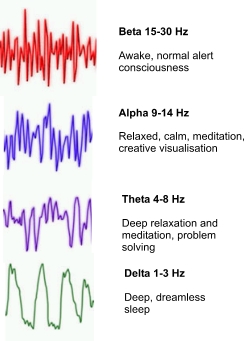 Neurofeedback training devices translate brainwaves into an external signal such sounds, graphs on a computer screen, movement of your computer’s cursor, action in a video game and even the motion of remote controlled toys. Being able to hear or see your brainwaves in this way provides essential feedback for learning how to control them to improve mental focus, modulate your mood and sharpen your thinking.
Neurofeedback training devices translate brainwaves into an external signal such sounds, graphs on a computer screen, movement of your computer’s cursor, action in a video game and even the motion of remote controlled toys. Being able to hear or see your brainwaves in this way provides essential feedback for learning how to control them to improve mental focus, modulate your mood and sharpen your thinking.
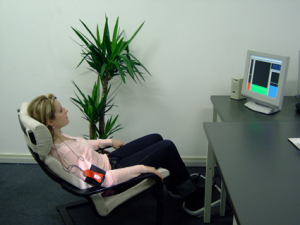 Neurofeedback has been proven to work in a clinical setting. You can go to a therapist and in about 10 weeks achieve some real results. A typical setup is shown to the left.
Neurofeedback has been proven to work in a clinical setting. You can go to a therapist and in about 10 weeks achieve some real results. A typical setup is shown to the left.
Devices for use by consumers at home are starting to hit the market. There are general purpose brain computer interfaces (BCI) such as the EPOC headset from Emotiv. It sells for $300 and comes with some basic games.
The only other consumer-level BCI I am aware of is being sold by Neurosky. It is cheaper ($199) but it comes with a single sensor versus the 14 for EPOC. The Neurosky technology is being used to develop mind-controlled toys. Check out Mattel’s Mindflex below.
It is not clear if the at-home neuofeedback devices are producing results or if they even work well. Consumer reviews tend to be mixed. For example, Mindflex Game has 58 customer reviews on Amazon:
- 5 star (14)
- 4 star (18)
- 3 star (8)
- 2 star (6)
- 1 star (12)
No matter, as the technology improves there can be little doubt that neurofeedback devices will become a powerful force for improving our cognitive performance. Brain computer interfaces, mind controlled toys and video games as well as other consumer-level neurofeedback devices will be covered frequently in the Next Brain Blog.
I am very interested to hear from readers that use neurofeedback in a clinical setting or at home. Please leave a comment and share your experiences.
Source: Image of Brainwaves and clinical use of Neurofeedback.
Categories: Executive Function, Mental Focus, Perception, Software, Training Tags: BCI, brain training, Brainwave Entrainment, games, neurofeeback
Audio Drugs for Your Brain?
 You can alter your brainwaves by playing sounds of slightly different frequency in each ear. Under the proper circumstances your brain stem will reconcile the difference by creating a rhythmic pulsing sound called a binaural beat. This is something you can actually hear but it is not really there. Your brainwaves may change in response to this auditory hallucination.
You can alter your brainwaves by playing sounds of slightly different frequency in each ear. Under the proper circumstances your brain stem will reconcile the difference by creating a rhythmic pulsing sound called a binaural beat. This is something you can actually hear but it is not really there. Your brainwaves may change in response to this auditory hallucination.
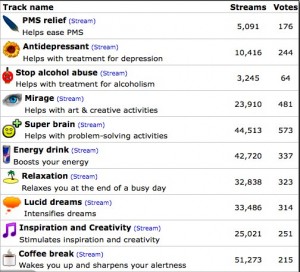 There have been many claims made about the effects of binaural beats from reducing anxiety to improving creativity and even producing drug-like feelings of happiness or euphoria. The hope that we can engineer a binaural beat experience, much like a drug, to create a specific brain boosting effect is very exciting. The idea of an audio or digital drug has caught on and there is even one company, i-Doser Labs, that markets binaural beats by the dose. You can try free doses HERE for improving energy, mental focus, lucid dreaming or even building a superbrain.
There have been many claims made about the effects of binaural beats from reducing anxiety to improving creativity and even producing drug-like feelings of happiness or euphoria. The hope that we can engineer a binaural beat experience, much like a drug, to create a specific brain boosting effect is very exciting. The idea of an audio or digital drug has caught on and there is even one company, i-Doser Labs, that markets binaural beats by the dose. You can try free doses HERE for improving energy, mental focus, lucid dreaming or even building a superbrain.
The question is, do binaural beat products really improve the performance of our minds and brains? Many people that use the products claim that they work. I have not been able to find many scientific or clinical studies on their effectiveness. We will continue to explore this issue on the Next Brain Blog.
If you have experience with binaural beat products or know of empirical studies on their effectiveness please leave a comment.
Source: Image of constructive interference pattern that creates binaural beat.
Categories: Music and Audio Tags: Brainwave Entrainment
Enhanced Music Accelerates Brain Function
There is no doubt music stimulates our brain. Listening to your favorite song can generate a flood of emotions and memories. But can music be used to enhance mental focus, IQ, memory or otherwise build your NextBrain?
According to Volition Thought House the answer is yes. They have developed a way to spike normal music with beat patterns and frequencies to build your brain strength automatically while listening. The product is called iMusic and is an example of Brainwave Entrainment.
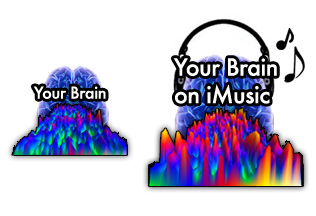 The company has done several small research studies that demonstrate positive effect (including one that shows improved sleep), has a patent and explain the technology fairly clearly in several white papers.
The company has done several small research studies that demonstrate positive effect (including one that shows improved sleep), has a patent and explain the technology fairly clearly in several white papers.
You can get a free sample here but have to listen to a lot of commercials. If you do the free sample be sure to hit “play list” and watch the 3rd testimonial. It is by a physician that took a hard look and was impressed.
I tried an earlier free sample and loved it! Perhaps it is a placebo effect but I felt more focused and energized while listening. Products range from $20-$120 and I’ve placed an order.
I will blog on my experiences later. Meanwhile please share your ideas and experiences with music-based cognitive improvement techniques.
Categories: IQ and EQ, Memory and Learning, Mental Focus, Music and Audio, Sleep Tags: Brainwave Entrainment

